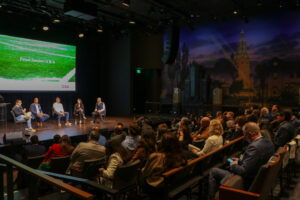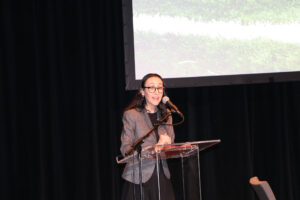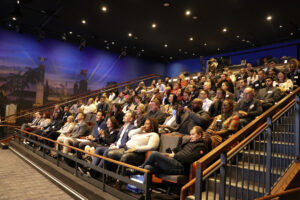 January 23, 2024 – The LAEDC hosted Future Forum on Sports & Entertainment, “Making Los Angeles the Global End Zone” in partnership with California State University – Dominguez Hills and powered by Verizon Wireless with special host UCLA who opened up their newly renovated Nimoy Theater for our discussion.
January 23, 2024 – The LAEDC hosted Future Forum on Sports & Entertainment, “Making Los Angeles the Global End Zone” in partnership with California State University – Dominguez Hills and powered by Verizon Wireless with special host UCLA who opened up their newly renovated Nimoy Theater for our discussion.
According to LAEDC’s Institute for Applied Economics report “Sports in the Los Angeles Basin – Economic Impact Study,” the industry supported more than 83,400 jobs and had a total output of $8.9 billion, with the second largest number of sports teams in the United States (following the New York City metro area). Within just one year, we have seen that direct revenues in the industry increased by more than $717.8 million in 2022 over 2021, up $340.8 million for collegiate sports and up by $377.0 million for professional sports, resulting in significantly larger economic impacts.
During this Future Forum, we focused on envisioning the future of Los Angeles within the Sports & Entertainment industry, the global influence Los Angeles has on sports worldwide, and the impact sports have on our regional economy. Conversations like the LAEDC Future Forum allow for a robust discussion and the ability to create partnerships ahead of major sporting events like the 2026 FIFA World Cup, the 2026 NBA all-star games, and the 2028 Olympics and Paralympics.
Maria Camacho, Director of Government Affairs of the LA Rams and in partnership with the LA Sports & Entertainment Commission, discussed the remarkable decade of major sporting events hosted in the LA region. She highlighted key events, including 2022’s Super Bowl LVI, where the LA Rams beat the Cincinnati Bengals, the MLB All-Star Game at Dodger Stadium, and 2023’s College Football Playoff National Championship, WrestleMania 39, and the 123rd US Open Championship. These events collectively generated over a billion dollars in economic and community impact for the LA region.
Ms. Camacho spoke in-depth about the LA Sports Entertainment Commission, which bids on and wins major sporting events, and its establishment of a supplier diversity program called Business Connect. This program engages local and small businesses, delivering $7 million in contracts since Super Bowl LVI. Community impact efforts through these events awarded grants to over 100 individuals and organizations.

Looking ahead, Ms. Camacho is proud of how Los Angeles will host a series of major events, including the 2026’s NBA All-Star (at the new Intuit Dome), US Women’s Open Championship, FIFA World Cup, Super Bowl LXI (returning to SoFi Stadium), and the 2028 Olympic and Paralympic Games, which will be held across Los Angeles County. Ms. Camacho emphasized LA’s commitment to remaining a key player on the global stage for Sports & Entertainment, backed by top-notch venues, facilities, and partners.
Following Ms. Camacho, Jay Tucker, Executive Director of the Center for Media, Entertainment & Sports at UCLA Anderson School of Management, facilitated a panel discussion that delved into the substantial impact of major sports events on Los Angeles’ economy and community.
The panel included:
- Dr. Yann Abdourazakou, Professor, Department of Management and Marketing, College of Business Administration and Public Policy, CSUDH
- Luciano Escudero, VP of Media Engineering, Globant
- Leila Lee, Director, Economic Policy, Los Angeles Mayor’s Office of Economic Development
- Luke Wang, General Manager, Verizon LA Innovation Lab
Dr. Abdourazakou emphasized the significant economic contributions of events like the Super Bowl and the Olympics, highlighting the influx of visitors and the consequential boost in local business revenues and job creation. He painted a vivid picture of the logistics and infrastructure demands these mega-events entail, from standpoints that included technology, infrastructure, and mobility, likening the Olympics to other global gatherings in scale and complexity.
Mr. Escudero discussed the transformative potential of such events on urban development and public transport, pointing out the dual-edged sword of gentrification and the displacement of local populations and how organizers, venues and local governments can work in tandem to avoid as much disruption as possible by adopting clear policies and programs to benefit everyone. He stressed the importance of vocational training and community engagement to ensure a lasting positive legacy.
Ms. Lee spoke about the City of Los Angeles’s efforts to prepare businesses for the upcoming sports economy, citing initiatives like the Sports & Entertainment Supplier Diversity Forum and Contract Ready LA. These programs aim to connect local businesses with major event opportunities, ensuring a broader economic benefit from these international gatherings. She also discussed the need that will arise in 2028, when the temporary employment for the Olympic and Paralympics has ended, and the need to move individuals into permanent employment.
Mr. Wang from Verizon’s innovation Lab shared insights into the technological advancements being deployed to support the influx of data usage expected during these events, including how we can ensure that faster speeds are available for businesses on-site and the fan experience. Ideas that are in development include using private networks within venues to ensure seamless connectivity and the broader implications for citywide infrastructure to support such large-scale events.
The panel collectively highlighted the importance of partnerships, community engagement, and innovative solutions in maximizing the benefits of hosting global sports events. They pointed to the need for careful planning and collaboration across various sectors to ensure that Los Angeles hosts successful events and secures a lasting positive impact for its residents and businesses.
Kelly LoBianco, Director of the LA County Department of Economic Opportunity, closed the event and emphasized the potential of upcoming major events like the World Cup and LA 28 to catalyze smart and inclusive economic development across LA County’s extensive geography, which will boost our local economy, including infrastructure development, broadband investments to bridge the digital divide, revitalizing venues, and providing quality, well-paying jobs for Angelinos. Ms. LoBianco touched on the county’s efforts to foster business growth through increased certifications and technical assistance for entrepreneurs and small businesses. She underscored the significance of neighborhood activation and investment in social infrastructure to create a welcoming environment for visitors and ensure a legacy for local communities.

The Future Forum: Making Los Angeles the Global End Zone featured many takeaways, including:
- Magnitude of the Olympic Games: The massive scale of the Olympic Games, comparable to multiple Super Bowls each day in terms of visitor numbers and contracts issued, will significantly impact the local economy and infrastructure.
- Geographical and Cultural Complexity: Los Angeles’s biggest asset is our diversity, with more than 100 nationalities and 224 languages, underlining the complexity of coordinating across various cities and regions for the Games.
- Partnership and Engagement: Los Angeles is primed to take multiple partnerships and collaboration across sectors and communities to host large-scale events, successfully leveraging their present opportunities.
The conversation continued after the event, when panelists, event guests, and LAEDC staff participated in a networking reception.
LAEDC invites attendees to participate in upcoming Future Forums and LAEDC events to help guide industries such as Sports & Entertainment to help understand the complexities, opportunities, and challenges of hosting large events. Please reach out to Janice Levy, Director of Strategic Relations and Membership, to understand how you can partner with LAEDC and support the growth of our regional economy.
Save the date for LAEDC’s next Future Forum on Aerospace & Defense on April 11th.